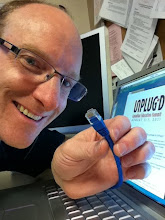What Students Accomplish
If you attend school at the Science Leadership Academy in Philadelphia, the reflection by your principal, Chris Lehmann, might lead everyone to reflect on what the graduating class has accomplished; not just in one defining year, but in an entire high school career.
If you're Megan Palevich, you lead your students to reflect on what they've accomplished, and you discover, that they've learned much more than the curriculum dictates.
Learning With Colleagues
Do you work within a community of teacher-learners?
How have you acted as a mentor to fellow teachers?
Which discoveries have you shared with your colleagues?
Is the sharing of your personal/professional learning a common practice at your school?
Learning in Community
How have you highlighted student achievement for your community?
Have your parents discovered what learning looks like?
Do folks know why you structure learning the way you do?
Have the doors of your classroom been open to visitors?
How have real people augmented your lessons?
Which learning stories are worth sharing with an even wider audience?
How have you publicly celebrated the greatest achievements and minor miracles from this school year?
What about You?
 Sure, you've grown too. You've used proven methods and mixed in the use of some new lessons and tools. But it's in the work of our students and colleagues in the context of a learning community that we can best measure the effectiveness of our work. So before you hold up the mirror to yourself at year's end, hold it up to your fellow learners, including teachers, students and community members, and consider the ripples that have been triggered by your work.
Sure, you've grown too. You've used proven methods and mixed in the use of some new lessons and tools. But it's in the work of our students and colleagues in the context of a learning community that we can best measure the effectiveness of our work. So before you hold up the mirror to yourself at year's end, hold it up to your fellow learners, including teachers, students and community members, and consider the ripples that have been triggered by your work. Photo Credit: A6U571N



